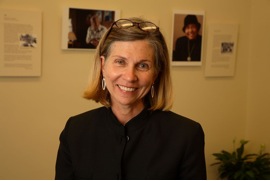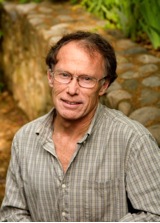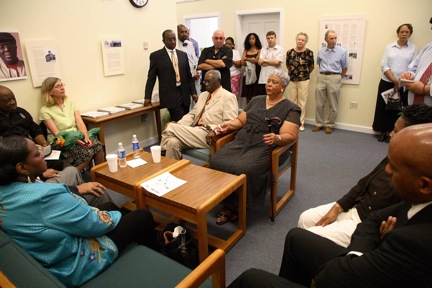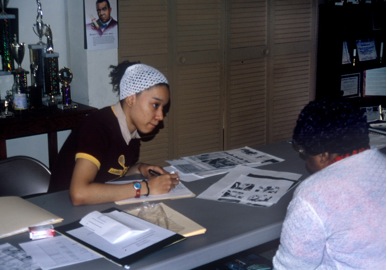Contact Information
Emma C. Edmunds

Emma Edmunds is the principal researcher for Mapping Local Knowledge: Danville, Va., 1945–75. She is a journalist by training, having worked as a reporter at the Atlanta Constitution and as a writer and editor at Atlanta Magazine. In 1998, she was a fellow at the Virginia Foundation for the Humanities. Ms. Edmunds is a native of Halifax, Virginia, a town of 900 people located about thirty miles from Danville. Since 1998, she has conducted more than thirty oral histories and collected dozens of documents related to the African-American history of the Danville region. Contact her at ee9b@virginia.edu.
Tom Cogill

Tom Cogill, who took the ten portraits of those featured in this exhibit, is a freelance photographer based in Charlottesville, Virginia. His work has appeared in many national magazines, including U.S. News & World Report, National Geographic, National Geographic Traveler, American Heritage, Science, Psychology Today, and the Chronicle of Higher Education, as well as in many university publications throughout the country. His work for humanitarian foundations in Central America was shown at the C&O Gallery in Charlottesville in 2009; a book on the work of Honduran land reform leader Elvia Alvarado was published the same year. His work may be viewed at www.tomcogill.com. Contact him at tc@tomcogill.com.
Carter G. Woodson Institute for African-American and African Studies

Photo: Tom Cogill
The Mapping Local Knowledge exhibit—first shown at the Carter Woodson Institute at the University of Virginia in 2005—opened with an event honoring the individuals featured. Above, Dorothy Harris, center and seated, shares a story with attendees.
The Mapping Local Knowledge: Danville, Va, 1945–75, exhibit began under the auspices of the Local Knowledge project at the Woodson Institute. After being displayed at the Woodson Institute in 2005, the exhibit traveled to Averett University, Danville, 2007; Danville Public Library, 2008; Virginia Black Expo: A Cultural and Commerce Exposition, Hampton, on the 400th anniversary of Jamestown, 2007; and the Southern Higher Education Center, South Boston, Virginia, 2010.
For more information on the Carter G. Woodson Institute, visit here. For an article on the display at the Southern Higher Education Center, click here.
Faculty Advisers
Faculty advisers include Scot French, director of the Virginia Center for Digital History and an associate professor of history at the University of Virginia; Reginald Butler, associate professor of history at the University of Virginia; Holly Shulman, research professor of history at the University of Virginia; and Elaine Day, library director and associate professor at Averett University, Danville.
University of Virginia Student Researchers

University of Virginia students Gladys Hairston (College ’04), Lydia Long (College ’06), Sara A. Stephens (College ’06), Stephanie Pinckney (College ’07), Douglas Lewis (College ’09) Jewell Debnam (College ’10), and Paul Wiley (College ’10) have assisted with research and the collection of documents, photographs, and oral histories for the Mapping Local Knowledge: Danville, Va., 1945–75 project.
Other Credits
William Covert created the design for this website; Nicholas Chavez (College '09) assisted with the posting of text and photos. Gail Hyder Wiley proofread and helped edit the text. Kirsten Sugerman designed the original exhibit. Joanne Lattiak transcribed the interviews.
Funding and Support for This Project
Funding for this project has been provided by the Virginia Foundation for the Humanities, which awarded Emma Edmunds a fellowship in 1998 to begin an oral history project on the Danville civil rights movement and in 2008 provided support for the online version of the exhibit. For information on the Virginia Foundation for the Humanities, see http://www.virginiafoundation.org/.
Since 2003, the Elizabeth James Grant Trust of Danville has been extremely generous in its funding of the research that made this online exhibit and other related public and research programs possible. The complete oral history transcripts of many of those featured here are available at the Danville Public Library, the Mary Blount Library at Averett University, and Danville Community College. For more information, contact Emma Edmunds at ee9b@virginia.edu or 434-924-3802.
